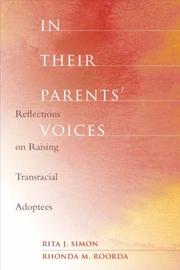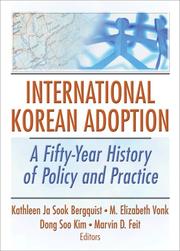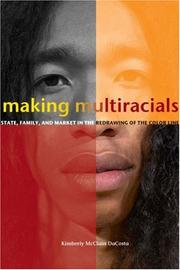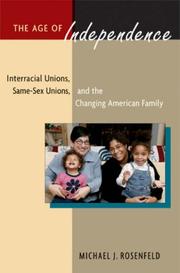| Listing 1 - 10 of 16 | << page >> |
Sort by
|
Book
Year: 2007 Publisher: London : BAAF,
Abstract | Keywords | Export | Availability | Bookmark
 Loading...
Loading...Choose an application
- Reference Manager
- EndNote
- RefWorks (Direct export to RefWorks)

ISBN: 023114136X 0231141378 023151235X 132259208X 9781322592084 9780231512350 Year: 2007 Publisher: New York : Columbia University Press,
Abstract | Keywords | Export | Availability | Bookmark
 Loading...
Loading...Choose an application
- Reference Manager
- EndNote
- RefWorks (Direct export to RefWorks)
Rita J. Simon and Rhonda M. Roorda's In Their Own Voices: Transracial Adoptees Tell Their Stories shared the experiences of twenty-four black and biracial children who had been adopted into white families in the late 1960s and 70s. The book has since become a standard resource for families and practitioners, and now, in this sequel, we hear from the parents of these remarkable families and learn what it was like for them to raise children across racial and cultural lines.These candid interviews shed light on the issues these parents encountered, what part race played during thirty plus years of parenting, what they learned about themselves, and whether they would recommend transracial adoption to others. Combining trenchant historical and political data with absorbing firsthand accounts, Simon and Roorda once more bring an academic and human dimension to the literature on transracial adoption.
Book
ISBN: 9781416591023 1416591028 Year: 2007 Publisher: New York : Gallery Books/Karen Hunter Publishing,
Abstract | Keywords | Export | Availability | Bookmark
 Loading...
Loading...Choose an application
- Reference Manager
- EndNote
- RefWorks (Direct export to RefWorks)
THE IRREVERENT, EYE-OPENING, AND HILARIOUS BOOK THAT DARES TO ASK...Why do so many high-profile black men date and marry the most ordinary white women?Why do so many other black men desire and covet the company of white women?And why does this subject deeply touch so many people of both races?Are these provocative questions matters of love, sex, revenge, power, or politics? All of the above, asserts Rajen Persaud in this illuminating, no-holds-barred book that will have you laughing with recognition while fundamentally changing the way you see just about everything -- from sex and marriage to your own gender and race in all its foibles, pretensions, and ultimate possibilities.Challenging every one of our preconceptions about mixed-race relationships, Rajen Persaud's commentary lights up a topic that has only deepened in intensity and relevance in the decades since Sidney Poitier asked the world "Guess who's coming to dinner?" The answers, so deeply ingrained in our fabric as a nation and even grounded in our past, force us to look at ourselves and our culture with new eyes while pondering matters ofCELEBRITY: From Michael Jordan to Bryant Gumbel to Tiger Woods, high-profile affairs and marriages with no shortage of controversy.SEX: Are black men choosing white women -- or rejecting black women?RACE: How white male insecurity is the key to understanding racism.RELATIONSHIPS: Is it more than love that brings the races together?POLITICS: How fear is used to gain power, from sexual politics to global war.MEDIA: How movies and television keep black men running to white women....and much more. Get ready for Why Black Men Love White Women -- and finally understand the relationship phenomenon of our times.

ISBN: 9780789030658 Year: 2007 Publisher: Binghamton Haworth
Abstract | Keywords | Export | Availability | Bookmark
 Loading...
Loading...Choose an application
- Reference Manager
- EndNote
- RefWorks (Direct export to RefWorks)
Book
Year: 2007 Publisher: [Washington, D.C.] : U.S. Commission on Civil Rights,
Abstract | Keywords | Export | Availability | Bookmark
 Loading...
Loading...Choose an application
- Reference Manager
- EndNote
- RefWorks (Direct export to RefWorks)
Interethnic adoption --- Interracial adoption --- Foster home care
Book
ISBN: 0674260694 9780674260696 Year: 2007 Publisher: Cambridge, Massachusetts ; London, England : Harvard University Press,
Abstract | Keywords | Export | Availability | Bookmark
 Loading...
Loading...Choose an application
- Reference Manager
- EndNote
- RefWorks (Direct export to RefWorks)

ISBN: 0804755450 0804755469 9780804755450 9780804755467 Year: 2007 Publisher: Stanford Stanford university press
Abstract | Keywords | Export | Availability | Bookmark
 Loading...
Loading...Choose an application
- Reference Manager
- EndNote
- RefWorks (Direct export to RefWorks)
Interracial marriage --- Minorities --- Racially mixed people --- Racism --- Social conditions --- Race identity

ISBN: 0874216540 9786613267382 0874216559 1283267381 9780874216554 9780874216547 Year: 2007 Publisher: Logan, Utah : Utah State University Press,
Abstract | Keywords | Export | Availability | Bookmark
 Loading...
Loading...Choose an application
- Reference Manager
- EndNote
- RefWorks (Direct export to RefWorks)
Gretta Bitsilly, gin-steeped mother of two and self-proclaimed expert at standing outside the margins of ethnicity and peering in, has been all but eclipsed by the world that eludes her--as a wife, a writer, a skeptic in "the other land of Zion," Utah. Gretta has set off to Fort Defiance, Arizona, where she hopes to convince her Navajo husband, who has escaped not from his family but from alcoholism, to come home.Over a sputtering two-steps-forward, one-step-back desert journey, Gretta is diverted by chance, seizures, an inconstant memory, and the disjointed character of her irresolute quest.She is fueled by a volatile mix of rage and curiosity and is rendered careless by ambivalence toward her marriage--she knows a welcome mat will not be waiting for her, "that white girl" who can't seem to get anything right. On route Gretta finds herself lost in the landscape, in strange company, or in her own convolution of language and inner space. With a dictionary and a laptop she attempts to write herself into a better existence--a hopeful existence--and to connect points of intellectual, physical, even spiritual reference.This tale, though dark and difficult, is infused with tart, twisted humor. Confused, disheveled, self-deprecating, and self-destructive, Gretta is also sharp and funny. Here, first-time novelist Christine Allen-Yazzie breaks apart her own narrative arc but with gritty reality seals it near-shut again, if in rearrangement, drawing us into Gretta's wrestling match with herself, her husband, her addiction, and the road.
Women alcoholics --- Navajo Indians --- Deserts --- Voyages and travels --- Separated people --- Interracial marriage --- Women authors --- Journeys --- Travel books --- Travels --- Trips --- Geography --- Adventure and adventurers --- Travel --- Travelers

ISBN: 9780674024977 0674024974 Year: 2007 Publisher: Cambridge, Mass. : Harvard University Press,
Abstract | Keywords | Export | Availability | Bookmark
 Loading...
Loading...Choose an application
- Reference Manager
- EndNote
- RefWorks (Direct export to RefWorks)
Families --- Interracial marriage --- Same-sex marriage --- Young adults --- Domestic relations --- Social change --- Intermarriage --- Familles --- Mariage interracial --- Homosexuels --- Jeunes adultes --- Changement social --- Mariage mixte --- Family relationships --- Mariage --- Relations familiales --- Droit --- #SBIB:316.356.2H1134 --- #SBIB:316.356.2H3360 --- 316.356.2 <73> --- Young people --- Young persons --- Adulthood --- Youth --- 316.356.2 <73> Gezinssociologie--Verenigde Staten van Amerika. VSA. USA --- Gezinssociologie--Verenigde Staten van Amerika. VSA. USA --- Hedendaagse gezinsstudies: Noord-Amerika --- Gezinssociologie: alternatieve vormen van huwen en samenwonen (incl. homosexuele relaties)
Book
ISBN: 9782707139825 2707139823 Year: 2007 Volume: *4 Publisher: Paris La Découverte
Abstract | Keywords | Export | Availability | Bookmark
 Loading...
Loading...Choose an application
- Reference Manager
- EndNote
- RefWorks (Direct export to RefWorks)
Pendant la colonisation française, des dizaines de milliers d'enfants sont nés d'" Européens " et d'" indigènes ". Souvent illégitimes, non reconnus puis abandonnés par leur père, ces métis furent perçus comme un danger parce que leur existence brouillait la frontière entre " citoyens " et " sujets " au fondement de l'ordre colonial. Leur situation a pourtant varié : invisibles en Algérie, ils ont été au centre des préoccupations en Indochine. La " question métisse " a également été posée à Madagascar, en Afrique et en Nouvelle-Calédonie. Retraçant l'histoire oubliée de ces enfants de la colonie, cet ouvrage révèle une face cachée, mais fondamentale, de l'histoire de l'appartenance nationale en France : il montre comment les tentatives d'assimilation des métis ont culminé, à la fin des années 1920, avec des décrets reconnaissant la citoyenneté à ceux qui pouvaient prouver leur " race française ". Aux colonies, la nation se découvrait sous les traits d'une race. Cette législation bouleversa le destin de milliers d'individus, passant soudainement de la sujétion à la citoyenneté : ainsi, en Indochine, en 1954, 4 500 enfants furent séparés de leur mère et " rapatriés " en tant que Français. Surtout, elle introduisait la race en droit français, comme critère d'appartenance à la nation. Cela oblige à revoir le " modèle républicain " de la citoyenneté, fondé sur la figure d'un individu abstrait, adhérent volontaire à un projet politique commun et à souligner les liens entre filiation, nationalité et race.
Racially mixed people --- Miscegenation --- Métis --- Métissage --- Colonies --- History --- Histoire --- France --- History. --- Hybridity of races --- Racial amalgamation --- Racial crossing --- Race relations --- Bi-racial people --- Biracial people --- Interracial people --- Mixed race people --- Mixed-racial people --- Mulattoes --- Multiracial people --- Peoples of mixed descent --- Ethnic groups --- Métis --- Métissage --- Colonies&delete& --- Nationalité --- Citoyenneté --- Statut juridique --- Miscegenation (Racist theory)
| Listing 1 - 10 of 16 | << page >> |
Sort by
|

 Search
Search Feedback
Feedback About UniCat
About UniCat  Help
Help News
News